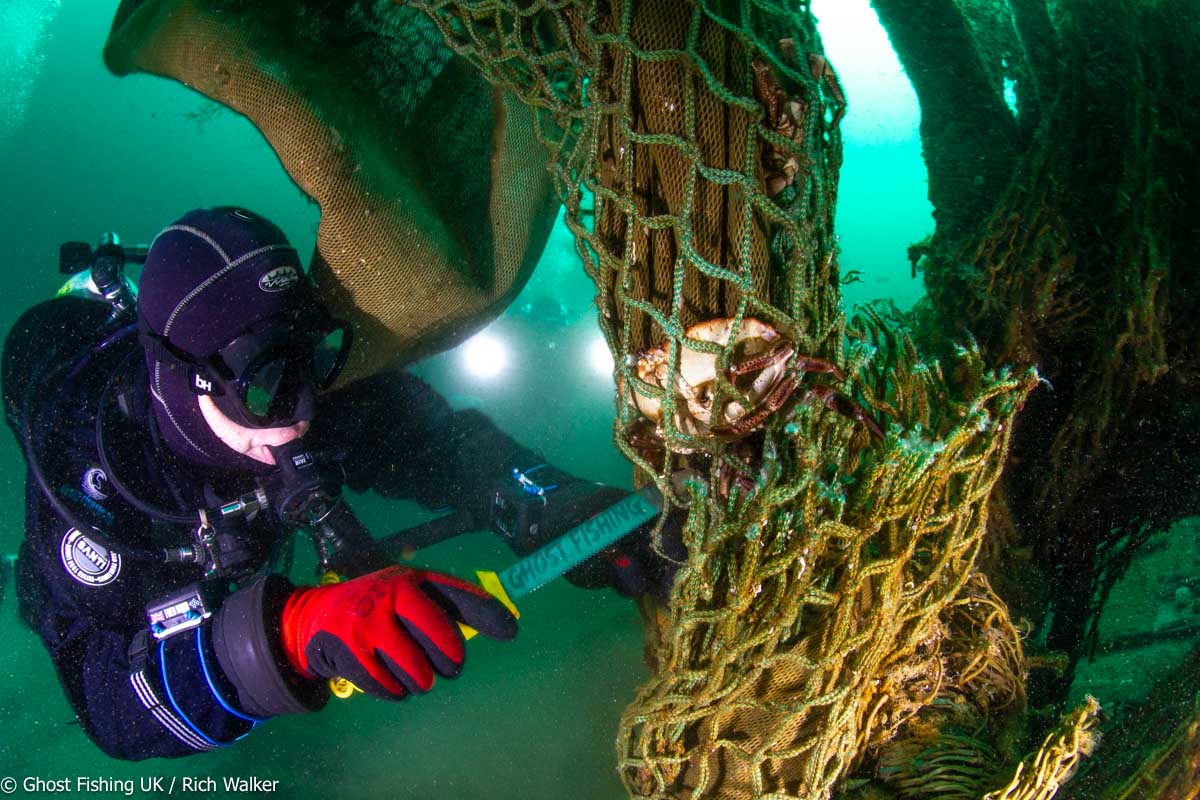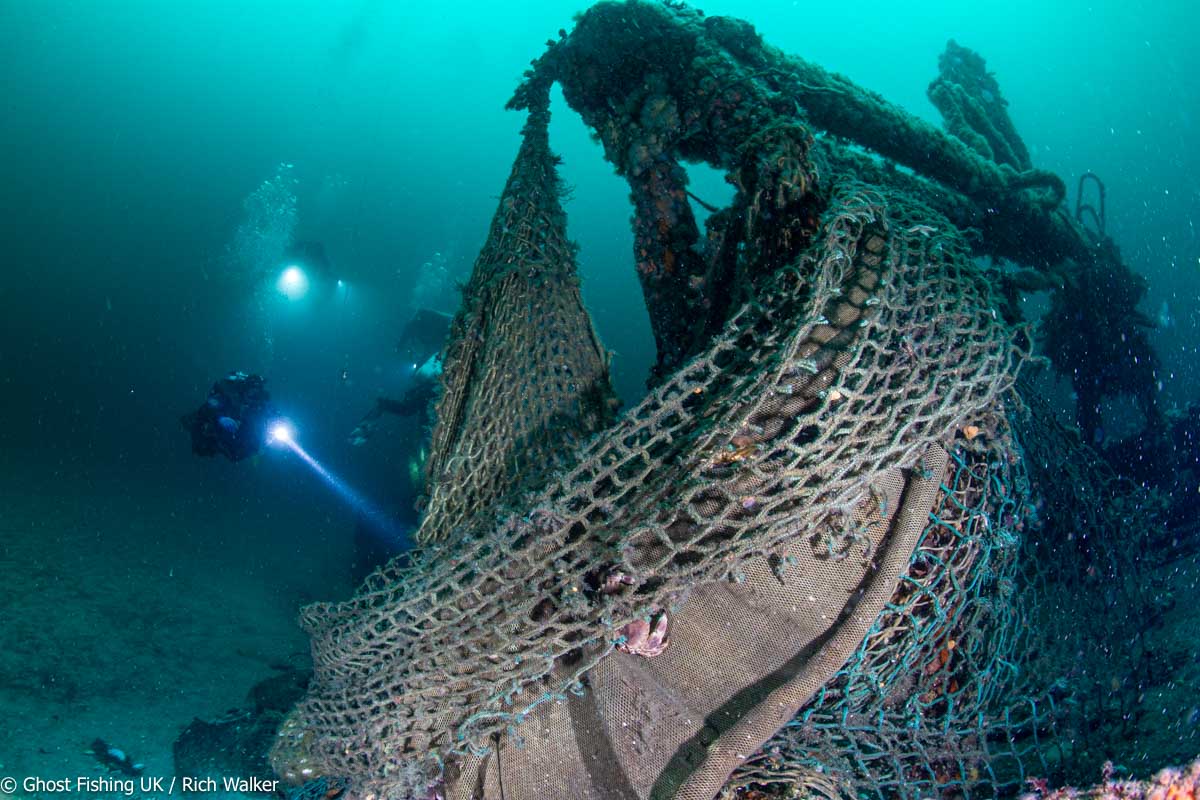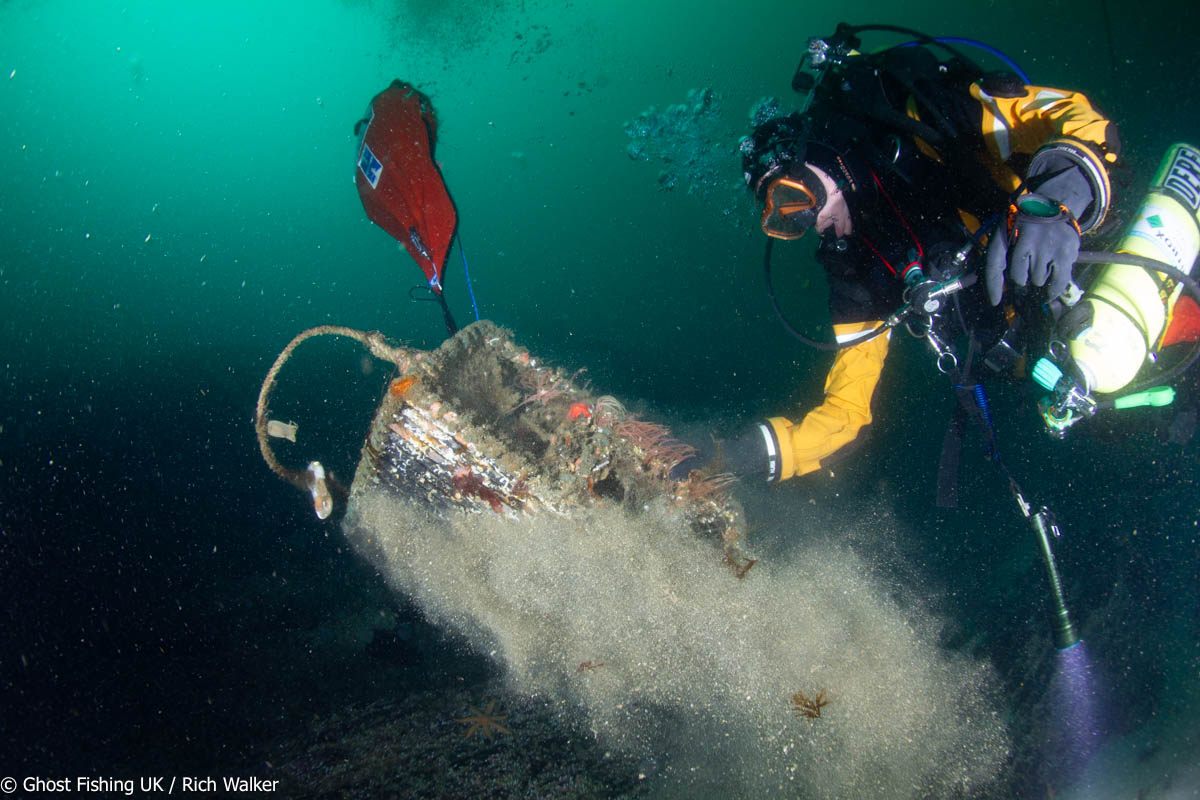Marine Life & Conservation
Divers recover 1500kg of lost fishing gear from Shetland waters

 Award winning charity Ghost Fishing UK are on their way home after a groundbreaking week, helping fishermen clean up lost fishing gear around Shetland.
Award winning charity Ghost Fishing UK are on their way home after a groundbreaking week, helping fishermen clean up lost fishing gear around Shetland.
They arrived and began diving on 6th August for one week aboard the MV Valhalla and in 6 days recovered 1500kg of lost fishing gear. It included a trawl net from the wreck of the Fraoch Ban, 41 creel pots and some keeper pots; all were returned to fishermen.
12 volunteer divers travelled to Shetland with the help of Northlink Ferries sponsoring their travel, helping out with a trip that totalled £18,000 to run.
Northlink said “We are delighted to be able to support such a worthwhile project…we hope (Ghost Fishing UK) have a good journey home. Well done to all involved. It looks like they have had a very successful time in Shetland clearing ghost gear. We are proud sponsors.”
The charity selects and trains divers themselves, all on a volunteer basis and the divers were grateful to receive support from Reel Diving and Halcyon Dive Systems who provided extra reinforcements such as extra bright pink lift bags, surface marker buoys, reels and regulators.
Trip organiser and charity trustee Christine Grosart explained “We were invited to Shetland by a group called Fishing Forward, who were concerned about the abundance of abandoned gill nets around Scottish waters which were being pulled in by their own trawlers. These nets are not used by local fishermen, yet they are causing havoc with wildlife and there are huge concerns about pollution, net dumping and littering from foreign gill netters.”
The charity is committed to working with the fishing community to try and solve the issues of ghost fishing, a phenomenon where lost or abandoned fishing gear continues to do its job, catching and killing marine life until it is removed from the sea. The charity has been heavily dependent on reports from fishermen to locate and remove lost fishing gear, particularly strings of creels.
Christine went on to explain “The gill nets tend to be in very deep water, and as they are often dumped, we have no way of knowing where they are. We decided to pick low hanging fruit this week and try and get some lost creels back to the local fishermen, whilst starting a discussion on how we can work together to solve bigger problems of gill nets. We could not have done this without the cooperation of the Shetland fishing community. Hazel, master of MV Valhalla has been working tirelessly to get the word out to fishermen that we were coming up to help. We are eternally grateful to her and the fishermen who reported their lost pots – they were delighted to get them back again.”
The divers headed 2 hours north to find a string of lost pots and returned them to their owner. Later in the week, another good report with clear marks led the team to recover another 20 pots, all of which were good enough to be taken back into operation by their owner and other fishermen who were happy to fix them up.
Keen to learn more about the fishing practices in the area, Arlene Robertson from Fishing Forward introduced the divers to John-Arthur, skipper of Kiama and he welcomed two of the team out on his creel boat for the day.
“We had the best day ever” Christine says “Matt and I learned so much from John-Arthur. He didn’t hold back telling us about the struggles of smaller local boats and we felt compelled at the end of the day to do all we could to help. He was kind enough to let us have a go at emptying and stacking creels, although I don’t think he’ll be offering us a job any time soon! What these guys do is incredible!”
On Thursday, the charity hosted an event at the Shetland Museum, with food provided by Hay’s Dock, followed by speakers from Ghost Fishing UK with an update on the Shetland project, then a talk from Arlene Robertson (Fishing Forward) about concerns surrounding industrial gill netting and pollution. The evening rounded up with Hillswick Wildlife Sanctuary and there was barely a dry eye in the house, followed by a question and answer session for the audience.
Attendee Jeanette said: “What a splendid, informative evening… Well done for organising. Great to hear about the work Ghost Fishing UK do….and (Fishing Forward) did a great job speaking up about the impossible situation the fishermen here and in the UK are finding themselves in. Hats off to you for all you are doing.”
Spokesperson for Fishing Forward, Alastair Inkster said “We had a very enjoyable presentation last night in the Lerwick museum from the Ghost Fishing UK team of divers in Shetland, at present recovering lost netting and creels.
The work this team is doing in cleaning up our marine environment is invaluable and we at Fishing Forward UK fully support their work and wish them every success in future.”
On Wednesday, when weather prevented diving from the boat, half the divers visited Hillswick Wildlife Sanctuary to meet the latest intake, three seal pups in need of human care prior to release.
Pete and Jan who have been running the sanctuary for 36 years said “It was extremely gratifying to have the team from Ghost Fishing UK arriving in Shetland to work on clearing old fishing nets, ropes and creels from the seabed around the islands. They are a passionate bunch of highly skilled people doing great work for our marine environment, which is in such desperate need of help from humankind. What made their visit even more inspiring was the close working relationship they have developed with Shetland’s fishing crews who are feeling squeezed by a pincer movement of government regulation on one side and unregulated competition on the other.
To witness conservationists working hand in hand with the fishing community to take on the responsibility of cleaning up our oceans is exactly the sort of example the world needs right now.”
The others set about responding to a report from a local lady in Gunnister Voe, recovering a mess of ropes and lost pots that had been long abandoned, from the shore.
The charity enlisted volunteers from the public to help with the washing down operation and were stunned to find that some people had travelled to Shetland specifically to help the charity.
“I couldn’t believe it” Christine said “They just turned up and set about pressure washing, sorting and bagging ropes, net and stacking pots. We clean the ropes because they are made of polypropylene and this can be recycled by our partner, Ocean Plastic Pots. All we needed was some help getting them back to the mainland.”
Two of those volunteers, Maggie and Simon Wilcox said “Beach cleaning at our home in Overstrand, Norfolk during Covid kept us active and focussed. We now pick beach rubbish wherever we go, home or away. When I read on social media that Ghost Fishing UK was heading to Shetland at the same time as us, we jumped at the opportunity to help out at the quayside and volunteer with these fabulous folks who give up their time to rid our coastal waters of ghost gear.”
The charity requested assistance from a local haulier and the very same day, Bryan Hepburn from DFDS Haulage Shetland responded.
“As soon as I heard about Ghost Fishing UK and spoke to Christine I knew this was something we’d be keen to support.” Bryan explains “ Cleaning debris from the sea, helping inshore fishermen recover lost gear and working in sympathy with local communities all chime with our core values and lived experience as members of a remote fishing community. With everything we do at DFDS supporting the cold chain transport of seafood across the UK we do it responsibly and sensibly. The team at Ghost Fishing UK are similar, the work they have done and the expertise they’ve shown is impressive.”
DFDS will assist the charity in shipping the sorted and cleaned ropes to Ocean Plastic Pots for recycling and the remaining ropes to Somerset for collection by artists, jewellery makers and similar. At the end of the week, the charity was delighted that the quayside was empty.
Lerwick port authority also supported the project, by offering an ideal berth for free to the team. Stuart Wadley, the Port Authority’s HSEQ Manager, said: “Ghost Fishing is to be congratulated on its efforts which are in line with our own commitment to protect the environment in all our operations and to work with third parties wherever appropriate. Ghost nets are often from foreign vessels and full of unintended catch.”
Chair of Ghost Fishing UK, associate professor of citizen science, Richard Walker, PhD, was keen that the project had a scientific element too. He said, “Successful outcomes in conservation efforts require a huge cooperation between volunteers, industrial partners and the scientific community.
The citizen science performed by Ghost Fishing UK divers for the Scottish Entanglement Alliance, augmented by professional scientific input from University Highlands and Islands, mean that the data recorded will form the foundations of ongoing conservation work in Shetland and around the United Kingdom.”
Ghost Fishing UK hope to return to Shetland to continue their work and are appealing for Fishermen to report and gear losses to their dedicated reporting system here: www.ghostfishing.co.uk/fishermans-reporting
You can follow the project on all social media platforms and visiting www.ghostfishing.co.uk
Blogs
Invitation from The Ocean Cleanup for San Francisco port call

6 years ago, The Ocean Cleanup set sail for the Great Pacific Garbage Patch with one goal: to develop the technology to be able to relegate the patch to the history books. On 6 September 2024, The Ocean Cleanup fleet returns to San Francisco bringing with it System 03 to announce the next phase of the cleanup of the Great Pacific Garbage Patch and to offer you a chance to view our cleanup system up-close and personal.
We look forward to seeing you there.
To confirm your presence, please RSVP to press@theoceancleanup.com
PROGRAM
Join The Ocean Cleanup as our two iconic ships and the extraction System 03 return to San Francisco, 6 years and over 100 extractions after we set sail, to create and validate the technology needed to rid the oceans of plastic.
Our founder and CEO, Boyan Slat, will announce the next steps for the cleanup of the Great Pacific Garbage Patch. Giving you a chance to view our cleanup system and the plastic extracted.
Hear important news on what’s next in the mission of The Ocean Cleanup as it seeks to make its mission of ridding the world’s oceans of plastic an achievable and realistic goal.
Interviews and vessel tours are available on request.
PRACTICALITIES
Date: September 6, 2024
Press conference: 12 pm (noon)
Location: The Exploratorium (Google Maps)
Pier 15 (Embarcadero at Green Street), San Francisco, CA
Parking: Visit The Exploratorium’s website for details.
RSVP: press@theoceancleanup.com
Video & photo material from several viewing spots around the bay
We look forward to seeing you there!
ABOUT THE OCEAN CLEANUP
The Ocean Cleanup is an international non-profit that develops and scales technologies to rid the world’s oceans of plastic. They aim to achieve this goal through a dual strategy: intercepting in rivers to stop the flow and cleaning up what has already accumulated in the ocean. For the latter, The Ocean Cleanup develops and deploys large-scale systems to efficiently concentrate the plastic for periodic removal. This plastic is tracked and traced to certify claims of origin when recycling it into new products. To curb the tide via rivers, The Ocean Cleanup has developed Interceptor™ Solutions to halt and extract riverine plastic before it reaches the ocean. As of June 2024, the non-profit has collected over 12 million kilograms (26.4 million pounds) of plastic from aquatic ecosystems around the world. Founded in 2013 by Boyan Slat, The Ocean Cleanup now employs a broadly multi-disciplined team of approximately 140. The foundation is headquartered in Rotterdam, the Netherlands, and opened its first regional office in Kuala Lumpur, Malaysia, in 2023.
Find out more about The Ocean Cleanup at www.theoceancleanup.com.
Marine Life & Conservation
SHARK MONTH ARRIVES AT ROYAL WILLIAM YARD, PLYMOUTH

A shark has been spotted approaching Royal William Yard in Plymouth, much to the surprise of swimmers, paddleboarders and onlookers.
With its distinctive dorsal fin cutting through the water, the sizeable shark swam along the coastline, before turning to head inland towards Firestone Arch at Royal William Yard. The appearance drew a crowd, who were captivated for more than an hour by the unusual sight – and it was all caught on video.
The shark is one of many expected sightings at Royal William Yard over the coming weeks… because today marks the start of Shark Month!
In reality, the ‘shark’ spotted along the Plymouth shoreline was actually a custom-made model, created by the team at Royal William Yard and sailed underwater by Caroline Robertson‑Brown from the Shark Trust, who donned scuba diving gear for the occasion.
The stunt took place to launch Shark Month in style and draw attention to the work of the leading international conservation charity, which is based in Britain’s Ocean City. Spectators were reassured that the water was safe and many entered into the spirit of the performance, swimming or sailing alongside the shark.
Shark Month will take place across Royal William Yard throughout July and will feature an extravaganza of art, entertainment and advocacy for everyone to enjoy. The packed programme of events starts with an art exhibition and ends with a trip on paddleboards with shark experts – with everything from a shark quiz to a Jaws screening in between.
Paul Cox, CEO of the Shark Trust, said: “There are often assumptions and misconceptions when it comes to sharks. This was certainly the case with the shark spotted at Royal William Yard! While the British coastline is home to many species of shark, this was not one of them. However, we’re thrilled it caught people’s attention, because seeing a shark is a special and memorable moment. That is precisely why we want to celebrate these incredible creatures, highlight the need for conservation, and ask for help to safeguard their future.”
For more information about Shark Month at Royal William Yard, visit the Shark Trust Website.
Images and video: Jay Stone
-

 Blogs2 months ago
Blogs2 months agoDiving With… Nico, Ocean Earth Travels, Indonesia
-

 News1 month ago
News1 month agoMurex Bangka Announce New Oceanfront Cottages & Beachfront Dining
-

 Blogs2 months ago
Blogs2 months agoA new idea in freediving from RAID
-

 Marine Life & Conservation1 month ago
Marine Life & Conservation1 month agoIceland issue millionaire whale hunter a licence to murder 128 vulnerable fin whales
-

 Marine Life & Conservation2 months ago
Marine Life & Conservation2 months agoThe Shark Trust Great Shark Snapshot is back
-

 News3 months ago
News3 months agoCharting New Waters; NovoScuba Goes Global with the Launch of their Revolutionary Dive Training Agency!
-

 Gear News1 month ago
Gear News1 month agoNew Suunto Ocean – a dive computer and GPS sports watch in one for adventures below and above the surface
-

 Marine Life & Conservation Blogs2 months ago
Marine Life & Conservation Blogs2 months agoBook Review: Plankton


















